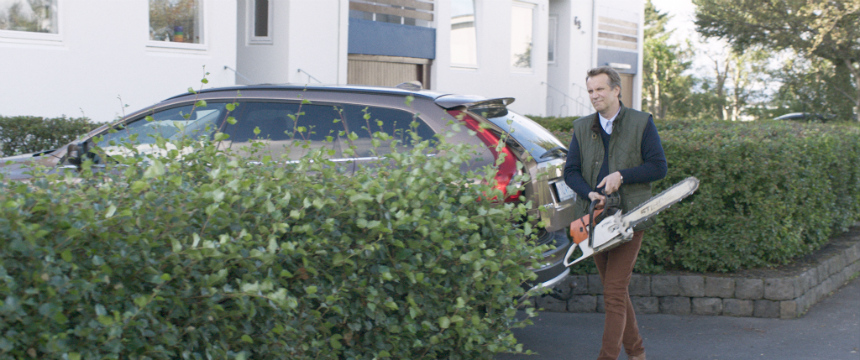Venice 2017 Review: UNDER THE TREE, Reason Eclipsed in Dark Icelandic Social Satire
Director Hafsteinn Gunnar Sigurdsson's third feature juggles two storylines.

On the heels of Winter Brothers, a dramedy about alienation, brotherhood and “being loved and fucked” (read the review), comes yet another Icelandic dramedy, Under the Tree.
Compared to the artist Hlynur Pálmason behind Winter Brothers, Hafsteinn Gunnar Sigurdsson has already made two feature-length films whilst his debut, Either Way, scored a second-life when David Gordon Green tried his hand at it, eventually turning it into Prince Avalanche (read the review). Sigurdsson´s recurring theme of people in crisis transposes unto his third oeuvre, although he opted for a bigger ensemble this time.
The writer-director juggles two storylines. He opens Under the Tree rather swiftly in a brisk sequence of a couple in a bed, porn being watched, an offended wife and a man being kicked out of the apartment. Atli, the culprit, who preferred to revisit saucy exploits with a former partner on archived footage instead of the real deal with his wife, heads for a temporary shelter home where his elderly parents live. A homecoming party does not await him there, since his parents start feuding with their neighbors, the apple of discord being a tree in their garden.
The tension around the tree soon escalates. Verbal implications and slandering grow into mindgames and mindgames into passive-aggressive guerilla combat before things take the dark turn. Sigurdsson dabbles in front-row seats, observing character dynamics and dysfunctional relationships, as he did in his previous outings. However, the front-and-center subject is not the petty bickering. The tree becomes just a pretense in an outpouring of suppressed frustrations of a group of people in a life crisis; they just happen to live next to each other.
Atli's mother, Inga, is a neurotic wreck and the driving force in the feud, not hesitating to up the ante in extremis, creatively and sickly. Her state of disarray is the product of family tragedy, the disappearance of her other son, believed by many to be a suicide.
Adding insult to the injury, and providing a trigger for her emotional corrosion and psychological volatility, remains the fact the her son cannot be declared dead until his body is found. The loss of a child on one side of the fence and futile attempts to conceive one on the other, fuel the scorching fire in a seemingly trivial quarrel, leaving nobody unharmed.
Embracing the cliché of neighbors' impotency to reach an agreement over banality, Sigurdsson paints a collective portrait of neurosis framed as a social satire. The writer-director positions the film in the special spot, marrying deadpan and leveled Icelandic comedy to psychological drama addressing an intimate subject, usually considered a social taboo.
Atli is not an outcast but a man-child, a pitiful character more naïve than cunning and, equally in the eyes of his wife, a victim of a mismatched relationship, preserved only for the sake of their small daughter. His mother is not necessarily evil, despite her witchy appearance, but the tragedy unseals a wrath stemming from a mother's grief, uncovering Inga's sociopathic side.
The patriarch of the family, Baldvin, remains the sanest person and the most sympathetic, thanks to Sigurður Sigurjónsson's priceless expressions, combining disbelief and perplexity, until he happens to be the Chekhov's gun in the final showdown.
Polish-born, Los Angeles-based cinematographer Monika Lenczewska recently pulsatingly lensed Sofia Exarchou´s Park (read the review) in immediate proxy to the characters and their flesh, the politics of bodies. Here, the cinematographer keeps her distance, giving preference to static shots to focus on the dynamics and confrontations, as well as the yawning rifts, between the characters. In addition to giving more than a Scandi-tinge to the picture, she drapes the image in a light blue hue, as blue as the story's content.
Sigurdsson makes a social cabaret and lo-fi caricature out of the neighborhood feud, revamping the concept of man as a noble savage in a petit-bourgeois suburb milieu. Notwhistanding the mounting tension and psychological violence, the writer-director does not drown the story in the mud of desperation, maintaining a spark of humanism that not all is lost and hopeless, even if a tragedy looms on the doorstep.
Sigurdsson utilizes Atli's storyline as a counterbalance to the headlong conflict of his parents with their neighbors in the plot's structure to partially break the downfall. Under the Tree aptly embodies the present times, when the state of civilization coagulates more into homo homini lupus-type of society, when diverse forms of extremism cast thick shadows over reason.
Undir tr�nu
Director(s)
- Hafsteinn Gunnar Sigurðsson
Writer(s)
- Huldar Breiðfjörð (story and screenplay)
- Hafsteinn Gunnar Sigurðsson (screenplay)
Cast
- Steinþór Hróar Steinþórsson
- Edda Björgvinsdóttir
- Sigurður Sigurjónsson
- Þorsteinn Bachmann







